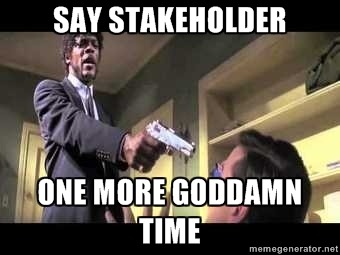
“Keywords for the Age of Austerity” is an occasional series on the vocabulary of inequality. Certain words, as Raymond Williams wrote in his classic Keywords, bind together ways of seeing culture and society. These shared meanings change over time, shaping and reflecting the society in which they are made. Some of the words I will consider here are old, seemingly innocent terms that have acquired a particular fashion or developed a particular new meaning in recent years; others are recent coinages. All of them relate to to an affinity for hierarchy and a celebration of the virtues of the marketplace, of competition, and of the virtual technologies of our time. This series will explore the historical meanings embedded in these words as well as the new meanings that our age has given them.
Care to suggest a word? Do do via the link at left, or tweet at me.
Stakeholder (n.)
Writing teachers know that one of the laziest writing errors is what we might call the “paleontological fallacy.” Unsure of how to begin, writers will frame an argument in the broadest terms possible, by opening with some timeless generalization: e.g., “in all of human history,” “ever since ancient times,” or “ever since dinosaurs roamed the earth.”
Here is an example from the management textbook Basics of International Business (2009), which introduces aspiring executives to the concept of “stakeholder theory” (italics added):
From the earliest of times, safeguarding shareholders’ and/or owners’ interests has been the paramount goal of corporate executives; taking responsibility for the concerns of and interests of stakeholders, on the other hand, is a relatively new concept, probably less than a hundred years old.
The problem with such paleontological fallacies is not just their imprecision, although “earliest of times” is so grammatically strange a construction as to become almost metaphysical: when can we say that time really begins, anyway? Is there a point, the earliest point, even earlier than that? And were there any stockbrokers then?
The real problem with these generalizations is their indifference to historical change, such that whatever specific subject one is discussing—marriage in “The Yellow Wall-Paper,” for example, or the meaning of democracy under Reconstruction—is hollowed out. The shareholder corporation becomes a natural part of human social life, something we have always known, ever since dinosaurs walked the Earth. It seems natural, practically legible in the fossil record. This naturalization becomes relevant to the keyword of the stakeholder because it is a term with a historically, and for most of that time exclusively, financial meaning that is often overlooked in its popular usage, where it has come to refer to non-profit and even democratic activities. Like so many such terms—innovation is another—this transition from a specifically financial to a broadly social meaning is rarely remarked upon.
The primary meaning of stakeholder in the Oxford English Dictionary identifies it as “an independent person or organization with whom money is deposited, esp. when a number of people make a bet or other financial transaction.” It is thus financial, even speculative—notice the particular link to gambling, one of the most common 19th-century uses of the word. A “stakeholder” is the person or group with whom others’ money is deposited, often a third party or trustee. More recently, it has become commonly used by non-profit voluntary organizations, in education, community development, and other sectors. Here, a “stakeholder” is anyone with an interest (a metaphorical “stake”) in the success of an organization.

Here is a non-metaphorical stakeholder (thanks Nick)
The concept of the “stakeholder” in business management is often credited to the Harvard Law School professor E. Merrick Dodd, who did not use the word itself (that honor appears to belong to a later management theorist, R. Edward Freeman) but outlined its meaning in a 1932 Harvard Law Review article. In the midst of the Depression, Dodd argued for more responsible corporate practices, recognizing that “public opinion” had turned against the view that a corporation’s only obligation was to its shareholders. Without specifying how they should do so, but believing that “enlightened” managers should do so voluntarily—that is, without inconvenient legal compulsion from the state—Dodd argued that corporations were obliged to serve not only their shareholders, but all of their stakeholders, which also included employees, customers, and the general public. It is from this “stakeholder” concept that the notion of the “socially responsible” corporation derives.
As a term of organizational ethics, stakeholder theory makes a pretty simple claim. Managers of a firm have an obligation to those who have a “stake” in it, whatever that stake be fiduciary or circumstantial. The concept is vague, as some other management scholars have pointed out. One can read the invocation to take others’ stakes into consideration as ill-defined at best, given the competing interests of stockholders and employees. More ungenerous critics can read read it as little more than a plea that business leaders not act like sociopaths.
In British political rhetoric, the notion of the “stakeholder economy” was popularized by Tony Blair’s New Labour government as an ideal of upward mobility that foregrounds individual initiative while evading talk of social conflicts or obstacles. The stakeholder economy is “not about giving power to corporations or unions or interest groups,” he said. Rather, “It is about giving power to you the individual. It is about giving you the changes that help you get on. “ As in Dodd’s concept, “stakeholder” only approaches clarity about the bad things that it isn’t. (Although since Blair declared the British Tories to be partisans of the “no-stake economy,” maybe it didn’t approach too closely).
In American political discourse, “stakeholder” has been embraced by New York governor Andrew Cuomo in much the same way as Blair. It has also appeared recently as a term of gentle critique, to chide a disruptive major power like China. China is urged to be a “responsible stakeholder in the global system,” with the clear implication that it isn’t.
“Stakeholder” will likely prove persistent. While other synonyms exist for those who facilitate bets and investments, “stakeholder” seems increasingly essential in its recent organizational context, where few synonyms come to mind (at least to me). Individual organizations have such terms, of course. Labor unions have members, for example, but is there a term to refer in common to the workers in a factory, the employees of the restaurant down the street from the factory, the teachers at their children’s school, and so on? In this usage, “stake” may simply have been divested (to use another unavoidable financial metaphor) of its profit-seeking meaning and become something different.
As a term of political and business rhetoric, though, stakeholder belongs to our age of heightening inequality. Like other phrases derived from gambling and finance that have migrated into democratic politics—the appropriately gruesome phrase “skin in the game” comes to mind—stakeholder conflates access with rights, obscuring hierarchies of power under the veneer of cooperation.

Holding a steak in Rosemary’s Baby

[…] “Keywords for the Age of Austerity 2: Stakeholder” by John Patrick Leary […]
LikeLike